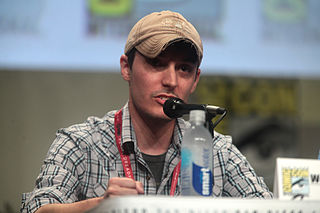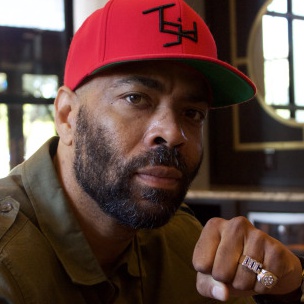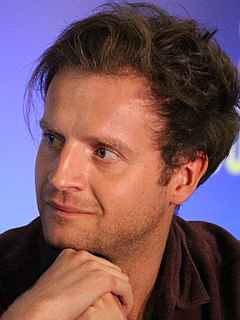A Quote by Todd Haynes
In the end, whether I write the script or, in this case, somebody else did, there's a point where you let it go when you're making a movie. You just have to. The thing that you shoot is not what you imagined in your head - it never is exactly that. And it shouldn't be.
Related Quotes
Once you are shooting a movie, even if it's your own script, you have to let it go at a certain point. That's true for every film. It breaks up into phases where the thing that you have in front of you is the thing you have to address, and you can't worry about what you imagined a scene was going to like and that it came out differently, because that's what you have to make work.
The way you write dialogue is the same whether you're writing for movies or TV or games. We use movie scriptwriting software to write the screenplays for our games, but naturally we have things in the script that you would never have in a movie script -- different branches and optional dialogue, for example. But still, when it comes to storytelling and dialogue, they are very much the same.
In editing, you really face what the movie is. When you shoot it, you have this illusion that you're making the masterpieces that you're inspired by. But when you finally edit the movie, the movie is just a movie, so there is always a hint of disappointment, particularly when you see your first cut.
When you are playing somebody who did exist, and there is good source material on them, whether it is a biography or archives or experts, you would be stupid not to delve into them. But there is a point in the process where you leave the books alone, and instead, you focus on the script and creating your version.
The thing with making your art your business is: It's a business. You can't sit around waiting for the muse, especially when you run a show, and you're in production, and an outline is due, a script is due, and a reshoot is due. No. You look at the calendar, and you go, 'OK. I can write from 4 to 6.' So you write.
Before, I was writing a script to make a movie. At a certain point, I became A Writer in Film and Television. So I got TV deals to write stuff, film deals to write stuff. But it's dangerous. I got into the WGA, and I became kind of, you know, a slave! They just pay you to write a script, and it's hard to make the movies.
Movies cost so much that studios really try to impose their personality over yours. A lot of times, you can get swallowed up in that and end up making movies that are indistinguishable from anybody else's. One of the things I've always tried to do is to inject myself as much as possible into the movie, so I feel like it's mine. But that also comes from what you choose to do and what you choose not to do. There are certain projects I could have said yes to, and I know exactly how they would have turned out: exactly the way they turned out when someone else did them.
Somebody comes to your house. You know they're coming, so it's not a surprise. And they give you an envelope that has your scenes in it. And they sit in the car outside for a half an hour while you read your scenes, then they ring your doorbell and you give your scenes back. Then you shoot the movie a few weeks later or something. The next time you see your scenes is the night before you start shooting. I never read the script [Blue Jasmine], so I didn't really know what it was about.





































